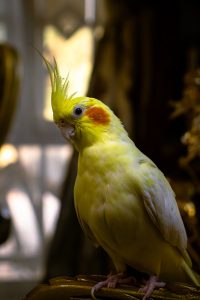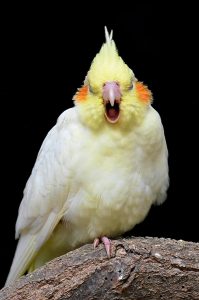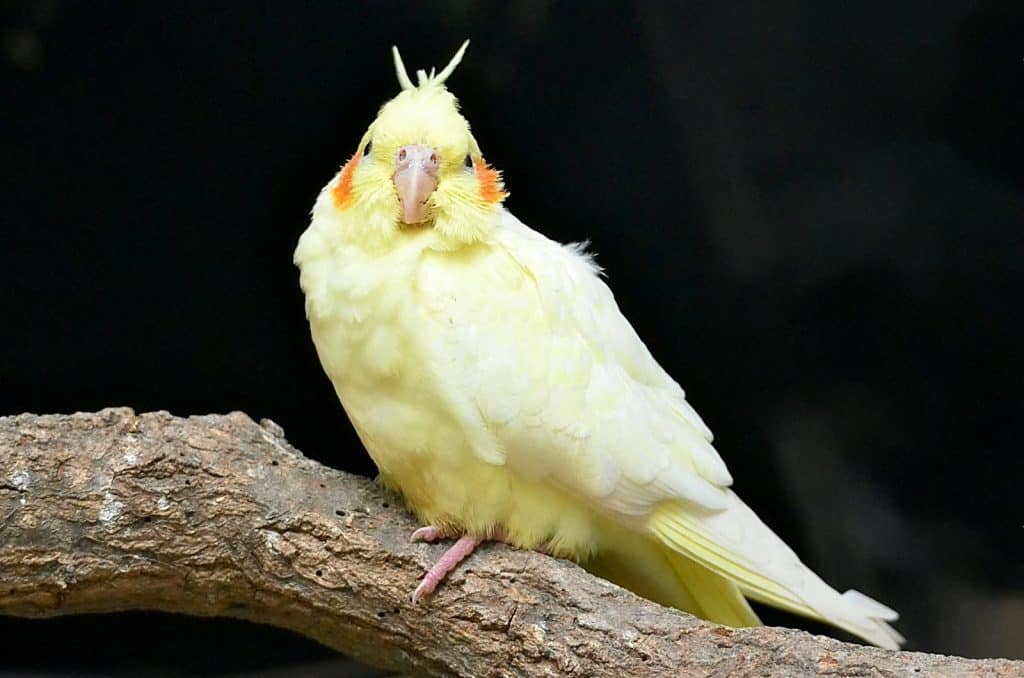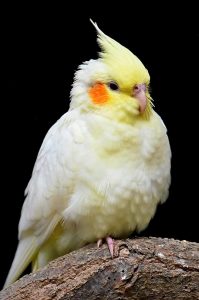As a devoted bird enthusiast, I’ve often marveled at the quirky behaviors of cockatiels. One behavior that frequently puzzles owners is hissing. “Why do cockatiels hiss?” you might wonder. It’s a question that reveals much about the emotional and physical state of these charming birds.
Hissing in cockatiels can signal various feelings or needs, ranging from fear and discomfort to a simple request for personal space. Understanding this behavior is crucial for nurturing a healthy relationship with your feathered friend. Let’s dive into the reasons behind this fascinating behavior to help you and your cockatiel live together more harmoniously.
Why Do Cockatiels Hiss?
Male and female cockatiel, even baby cockatiels display a variety of behaviors that are expressions of their emotional state and environmental responses. As pet owners, understanding why cockatiels hiss is integral to developing a deeper bond and ensuring their well-being. Let’s delve into the reasons behind cockatiel hissing and how to interpret these sounds correctly.
Reasons Behind Hissing
Cockatiels, like many pet birds, may hiss as a reflexive response to a perceived threat. The primary reasons for a cockatiel to exhibit hissing include:
- Fear: Cockatiels are naturally prey animals. If they feel threatened or scared, hissing acts as a defensive mechanism to ward off predators or unfamiliar individuals. An abrupt noise, a sudden movement, or the introduction of new pets can trigger this fear response.
- Territorial Behavior: If someone approaches their cage or they perceive a breach in their personal space, cockatiels might hiss to assert their territory. Both male and female cockatiels display this behavior, especially around their nest or in a crowded cage environment.
- Discomfort or Pain: When in discomfort or pain, cockatiels may hiss to communicate their distress. Observing this behavior should prompt a closer inspection to ensure that the bird is not suffering from any injuries or illnesses.
- Demand for Privacy: Sometimes, cockatiels hiss to signify their need for solitude. During periods of rest or while nesting, they prefer minimal disturbance and might hiss to maintain their privacy.
Interpreting Different Hisses
Understanding the nuances in a cockatiel’s hissing can greatly aid in responding appropriately to their needs:
- Long, Drawn-Out Hiss: This usually indicates a high level of distress or fear. It might happen if they’re exposed to a loud sound like a dog barking or during turbulent weather.
- Short, Sharp Hiss: A quick hiss often serves as an immediate reaction to a surprise or mild annoyance, such as the abrupt opening of the cage door or someone reaching into their space too quickly.
- Repeated Hissing: If a cockatiel hisses repeatedly, it’s likely feeling persistent irritation or threat. This could be from ongoing disturbances in their environment or from not having enough space in their cage.
Each of these hissing sounds serves as an effective communication tool, conveying messages about the pet bird immediate feelings and needs. By paying attention to the circumstances under which these hisses occur, I can better manage their environment and ensure a happier, less stressed pet.
Common Triggers for Hissing in Cockatiels
Cockatiels communicate through body language and vocalizations, including hissing when they feel threatened or uncomfortable. Understanding what triggers this behavior can help maintain a safe and comforting environment for these pet birds.

Fear and Anxiety
When cockatiels experience fear or anxiety, they often express this through hissing. Common causes include sudden loud noises, the presence of predators, or unfamiliar people around their cage. If a cockatiel perceives a large shadow or hears a disruptive sound, such as dogs barking or the slamming of a door, it might hiss to communicate its distress and fear. Reducing these disturbances and slowly acclimatizing the bird to new environments and faces can help minimize their anxiety.
Territorial Behavior
Cockatiels display territorial behavior, especially around their cage, which they consider their safe space. If someone approaches the cage too quickly or a potential threat lingers nearby, a cockatiel might hiss to assert its territory. This is particularly observable in male cockatiels, who are naturally inclined to protect their space. To avoid triggering this territorial response, it’s best to approach the cage slowly and speak in a gentle tone, allowing the cockatiels to recognize and trust your presence.
Pain or Discomfort
Hissing can also indicate that a cockatiel is in pain or experiencing discomfort. If the hissing is accompanied by unusual behavior such as puffing up of the facial feathers, lack of movement, or aggression when touched, these could be signs that the cockatiel is not feeling well.
In such instances, examining any changes in the bird’s environment that could contribute to its discomfort or scheduling a visit to a veterinarian might be necessary. Ensuring the cockatiel’s cage is clean, secure, and free from any hazards is crucial in preventing injuries that could cause pain or discomfort.

Responding to a Hissing Cockatiel
When a cockatiel hisses, it’s crucial to respond appropriately to ensure their comfort and safety. Understanding the underlying reasons behind this behavior helps in responding effectively.
Providing Comfort and Space
If a cockatiel hisses, it often means they’re seeking space or feeling threatened. I ensure they have a secure and tranquil environment by checking their cage placement. It’s essential to position the cage in a quiet area away from high traffic. I also make sure the cage is large enough to allow them freedom of movement, which reduces stress and prevents territorial behavior.
Giving them plenty of downtime without disturbance helps them feel safer. If I notice the hissing occurs when the cage door is approached, I gradually desensitize them to my presence by spending time near the cage without direct interaction, showing them that my approach isn’t a threat.
Addressing Causes of Distress
Identifying the specific causes of a cockatiel’s distress that lead to hissing is vital. Common triggers include loud noises, sudden movements, or the presence of other pets. When I address these triggers, I start by minimizing loud sounds and abrupt changes in their environment.
If other pets are causing stress, I introduce them to each other slowly and under controlled conditions. This helps my cockatiel understand that the other animals are not predators. Moreover, ensuring that my cockatiel has a place to retreat for privacy, such as a covered area in the cage, can significantly reduce their anxiety.
Tips for Introducing New Pets
Introducing new pets to a household with a cockatiel requires patience and careful planning. I ensure that the introduction is gradual and supervised to avoid any aggressive behavior. It’s important to keep the new pet at a distance initially and to observe the cockatiel’s body language closely.
Over time, I decrease the distance between the cockatiel and the new pet, monitoring their reactions. If I see signs of distress or aggression, I pause the introductions and try again later, proceeding more slowly. Using treats as positive reinforcement can also aid in creating a peaceful coexistence, helping my cockatiel associate the new pet with positive experiences.
Preventive Measures to Reduce Hissing
Addressing why cockatiels hiss often revolves around eliminating or mitigating scare triggers and discomfort. In this section, I’ll explore effective measures to help reduce instances of hissing through creating a safe environment and encouraging regular health check-ups.
Creating a Safe Environment
Creating a safe and comfortable environment is pivotal for reducing stress-related behaviors such as hissing in cockatiels. I ensure my cockatiel’s cage is located in a quiet part of the house, away from high traffic areas where loud noises or the presence of other pets might frighten them. It’s essential that the cage provides ample space for movement, and I always position it at eye level or higher to make them feel secure, as positioning lower can make them feel vulnerable to predators.
I also dedicate time to socialize my cockatiel gradually to any new environment or family members, including other pets, using positive reinforcement techniques to foster familiarity without stress. This can involve controlled introductions and ensuring that my cockatiel can always retreat to a safe spot if they feel overwhelmed. Enriching the cage with toys and perches provides not only entertainment but also offers a sense of safety, which helps a lot in minimizing stress-induced hissing.
Regular Health Check-Ups
Regular visits to an avian veterinarian play a crucial role in maintaining the health of my cockatiel, which directly affects their comfort levels and behavior, including hissing. Regular health check-ups help identify and address any underlying health issues, such as infections or nutritional deficiencies, that could cause discomfort or pain leading to hissing. By keeping my cockatiel healthy, I reduce the chances of discomfort-related hissing.
During these check-ups, I also discuss my bird’s behavior with the vet, which helps in understanding any possible changes in their health or environment that might be influencing their propensity to hiss. Keeping a close watch on their physical well-being allows me to make timely adjustments to their care regimen, ensuring they feel their best and are less likely to feel threatened or scared.
Understanding why cockatiels hiss is crucial for any pet owner looking to foster a nurturing relationship with their feathered friend. By recognizing the signs of discomfort or distress that lead to hissing you can take proactive steps to mitigate these issues.
It’s essential to provide a tranquil environment accommodate their territorial nature and ensure regular health check-ups to keep your cockatiel feeling safe and content. With these strategies you’ll likely see a decrease in hissing as your cockatiel becomes more comfortable and secure in their home environment. Remember patience and consistent care are key to creating a harmonious living situation for you and your cockatiel.
Frequently Asked Questions
What causes a cockatiel to hiss?
Cockatiels hiss as a reaction to fear, discomfort, or territorial instincts. It’s their way of expressing unease with a situation or to deter perceived threats.
How can you reduce hissing in cockatiels?
To minimize hissing, ensure your cockatiel feels safe by placing their cage in a quiet area, avoiding sudden movements, and gradually socializing them. Providing enrichment like toys and regular interaction can also help.
Why is it important to understand the reasons behind a cockatiel’s hissing?
Understanding why a cockatiel hisses can help you address the underlying issues, whether they’re related to fear, discomfort, or territorial behavior, improving their overall well-being.
What are some common triggers of hissing in cockatiels?
Common triggers include unfamiliar people, loud noises, sudden movements, or encroachment into their space. Physical pain or discomfort can also cause hissing.
How does creating a safe environment help in reducing a cockatiel’s stress?
A safe environment helps reduce stress by providing the bird with a sense of security and stability, which can decrease the frequency of stress-induced behaviors like hissing.
Why are regular check-ups with an avian veterinarian important?
Regular check-ups ensure that any health-related issues which might be causing pain or discomfort—and thus, hissing—are promptly addressed. It helps in maintaining the overall health and happiness of your cockatiel.
- Why Is My Cockatiels Poop Watery
- Why Is My Cockatiel Vomiting
- Why Is My Cockatiel So Quiet
- Why Is My Cockatiel Shaking
- Why Is My Cockatiel Losing Feathers
- Why Is My Cockatiel Laying Eggs On Bottom Of Cage
- Why Is My Cockatiel Eating So Much
- Why Is My Cockatiel Chirping So Much
- Why Does My Cockatiel Scream When I Leave The Room
- Why Does My Cockatiel Nibble Me
- Why Does My Cockatiel Keep Yawning
- Why Does My Cockatiel Hang Upside Down
- Why Does My Cockatiel Fly On My Head
- Why Does My Cockatiel Face The Wall 6 Reasons
- Why Does My Cockatiel Bob His Head
- Why Does A Cockatiel Stand On One Leg
- Why Do Cockatiels Sing
- Why Do Cockatiels Hiss
- Why Do Cockatiels Have Crests
- Why Do Cockatiels Eat Their Poop
- Why Do Birds Rub Their Beaks
- Why Do Birds Poop In Their Water
- Why Cockatiels Like Head Scratches
- Why Cockatiels Grind Their Beaks
- Why Choose A Cockatiel Bird As A Pet
- Why Are My Cockatiels Tail Feathers Falling Out
- Why Are My Cockatiels Fighting
- Why Are My Cockatiels Feet Warm
- Why Are Cockatiels So Dusty




